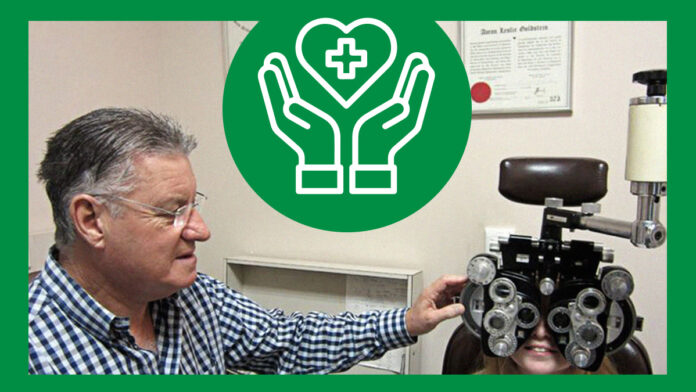By Avron Goldstein
Avron Goldstein, an optometrist with 40 years of experience, has an optometry practice in Wynberg. He also does weekly sessions at Victoria Hospital Eye Clinic. Avron has kindly provided information about eye health and common visual problems to the Cape Jewish Chronicle.
Common visual problems
He says that the most common visual problems that people encounter are poor distance vision, which weakens one’s eyesight for driving, watching TV, or seeing on a classroom board. In addition, many people struggle with activities that require close vision, such as reading, computer work and seeing the cell phone screen.
Everyone should have an eye examination once every two years.
Visual problems associated with age
Short-sightedness is usually hereditary and cannot be prevented but there are special spectacle lenses and contact lenses that can slow down the progression of short-sightedness. There is a high prevalence of short-sightedness within the Ashkenazi Jewish population.
The onset age of cataracts can also be slowed down by wearing protective lenses that block out ultraviolet rays from sunlight.
Glaucoma can be prevented by having your eye pressures measured and the optic nerve examined every two years especially after the age of 45. High eye pressure can cause blindness if not controlled.
Diabetes and vision
Diabetics should keep their sugar levels within the correct limits to prevent major damage to the blood vessels in the retina which, if not controlled, can cause loss of vision. A person with diabetes should have an eye examination once a year to check the blood vessels, and eye pressures should be checked every two years to monitor for glaucoma.
Serious visual conditions
Macula degeneration: The progression of some forms of this condition can be halted with injections into the eye.
Retinitis Pigmentosa: Spectacle lenses can help to improve vision but there is no treatment or cure at this time. This condition is fairly common within the Ashkenazi Jewish population.
Detached retinas: This is something that occurs unexpectedly and suddenly. It usually appears as a sudden loss of vision with continuous ‘flashes’ and can feel as if a ‘curtain’ has come down. Immediate treatment involving surgery must be implemented to prevent further loss of vision. The longer it’s postponed, the more damage will occur and the vision in that eye may never be as good as it was before the ‘tear’ in the retina.
Spectacles and contact lenses
In the majority of cases contact lenses are an accessory to spectacles and not an alternative. If you wear contact lenses, make sure you also have a pair of spectacles in case you develop a condition which may cause pain in your eye(s), for example an eye infection or a corneal ulcer.
Contact lenses are a good option for people doing activities in which spectacles cannot be worn, for example ballet and sports activities.
Contact lenses, as opposed to spectacles, can improve vision if you have a condition like Keratoconus or if you’ve had a corneal transplant.
Caring for spectacles and contact lenses
• Clean spectacles by rinsing them with water and drying them with the special cloth your optometrist would have supplied.
• When you take your spectacles off, use both hands so that you don’t stretch the frame.
• Contact lenses should never be used longer than the time specified by the optometrist.
• Only use solutions supplied by your optometrist.
• Never store your contact lenses in tap water.
Visual health for children
The use of digital screens for long periods may result in red, tired and dry eyes. While this may be uncomfortable, it does not mean
that permanent damage has been done to the child’s eyes. Close vision for extended periods may cause short-sightedness, but this is not definitely the case.
There is a theory that to reduce the chances of young children developing short-sightedness, they need to play outdoors in sunlight.
• Published in the November 2023 issue – Click here to start reading.
• To advertise in the Cape Jewish Chronicle and on this website – kindly contact Lynette Roodt on 021 464 6736 or email advertising@ctjc.co.za. For more information and advertising rate card click here.
• Sign up for our newsletter and never miss another issue.
• Please support the Cape Jewish Chronicle with a voluntary Subscription for 2023. For payment info click here.
• Visit our Portal to the Jewish Community to see a list of all the Jewish organisations in Cape Town with links to their websites.
Follow the Cape Jewish Chronicle: Facebook | Instagram | Twitter | LinkedIn












